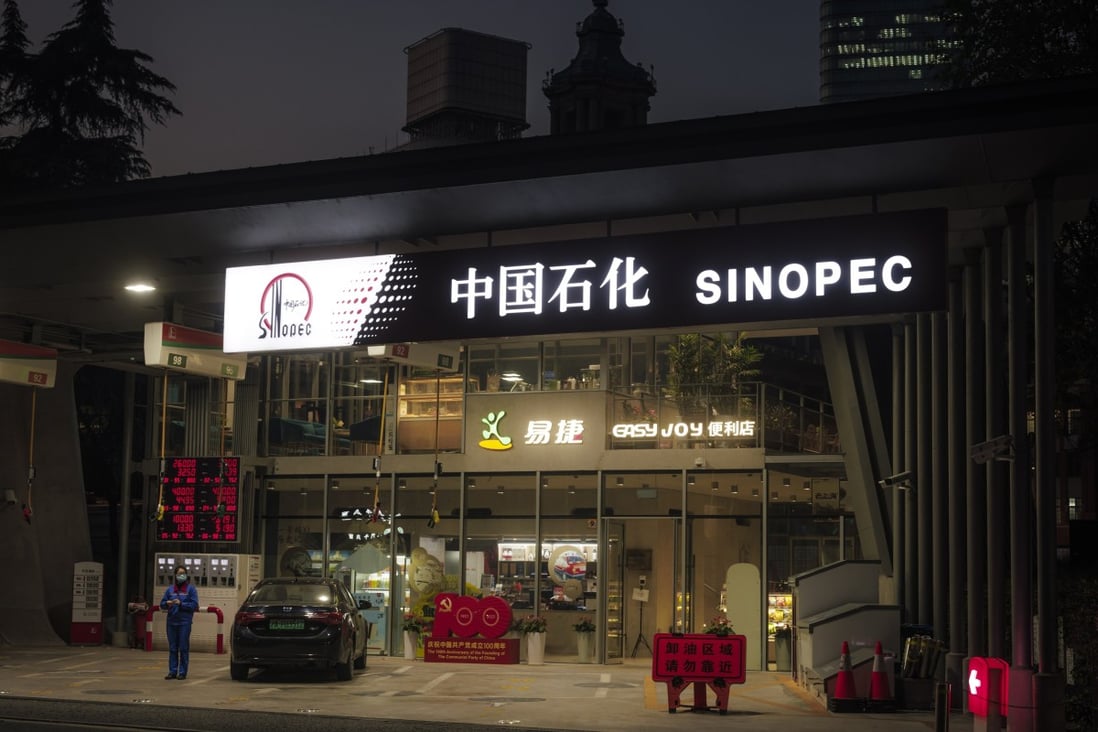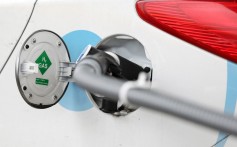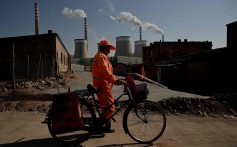The country’s largest oil refiner says it has started building the world’s largest facility of its kind, with production to start in 2023
The US$470 million project is expected to have an annual output capacity of more than 10,000 tonnes
Echo Xie
Published: 1 Dec, 2021

China’s largest oil refiner Sinopec has started work on the country’s largest solar-powered green hydrogen plant. Photo: EPA-EFE
China’s largest oil refiner China Petrochemical Corporation – also known as Sinopec – has started building the world’s largest green hydrogen plant, to be entirely powered by solar energy.
Sinopec said on Tuesday the 3 billion yuan (US$470 million) plant in Kuqa, in the far western region of Xinjiang, was expected to start production in June 2023, with a 20,000 tonnes-per-year capacity.
According to the company, it will be China’s first photovoltaic-powered hydrogen plant with an annual output capacity of more than 10,000 tonnes, as well as the world’s largest.
Sinopec urges Hong Kong government to kick-start hydrogen-fuelled transport
4 Oct 2021

Hydrogen, a highly reactive gas, has many industrial uses, including as a source of energy. China, which produces the world’s largest amount of it, mainly uses it as an industrial raw material – for example, to manufacture plastics or chemicals
Most of the country’s hydrogen is produced from fossil fuels, with just 4 per cent coming from renewable sources.
Green hydrogen – produced from renewable sources such as solar and wind energy – has significantly lower carbon emissions than grey hydrogen, which is produced using fossil fuels such as natural gas.
Sinopec’s demonstration project will go through the whole process of green hydrogen production and utilisation, including photovoltaic power generation, transformation, electrolytic hydrogen production, hydrogen storage, transport and refining.
The company will build a solar power station with an installed capacity of 300 megawatts to support hydrogen production. It will also build a hydrogen production plant from water electrolysis, hydrogen storage tanks and a hydrogen pipeline.
The plant will supply Sinopec’s oil refinery in Tahe, Xinjiang, replacing its current natural gas-based hydrogen production, saving an expected 485,000 tonnes of carbon dioxide emissions per year.
Two sessions: How China's environmental policies are giving a boost to green industries
Sinopec chairman Ma Yongsheng said the project would give full play to Xinjiang’s resource advantages and was a key project for the company’s ambitions to be the country’s No 1 hydrogen producer, according to party mouthpiece People’s Daily.
Han Xiaoping, a chief analyst at energy industry website china5e.com, said low land costs and high solar power generation efficiency in Xinjiang would reduce the overall cost of the Sinopec project.
And, while the cost of green hydrogen is relatively high compared to fossil-based hydrogen, intermediate transport costs would be reduced by supplying a local refinery, he said.
“Xinjiang has a strong chemical production capacity … The economics should be relatively acceptable.”
US-China rivalry ‘threatens further action on climate change’
11 Nov 2021

Sinopec is China’s largest hydrogen producer with a capacity of 3.9 million tonnes per year, accounting for 11 per cent of China’s total production. It aims to build 1,000 hydrogen refuelling stations during the 14th five-year plan period to 2025.
The company has three more green hydrogen production projects in the pipeline, including two in the northern region of Inner Mongolia and an offshore wind-based facility in the southeastern province of Fujian.
Careful planning to reduce risks for China on road to carbon net zero
25 Oct 2021

The adoption of low-carbon hydrogen will play a key role in China’s path towards carbon neutrality. According to a report by the China Hydrogen Alliance in May, the proportion of hydrogen energy in the country’s energy mix is expected to increase from about 3 per cent in 2018 to 20 per cent in 2060.
Already, 23 provinces and municipalities have issued plans and guidelines to develop their hydrogen industry. China is expected to release a mid- and long-term national plan for the sector after discussion, Shanghai Securities News said on Monday.
Goldman Sachs-backed ReNew Power joins India's big-name dash to green hydrogen
Developer links with conglomerate L&T to advance renewable H2 opportunities in market already focus of fellow giants

Sumant Sinha, CEO of ReNew Power.Photo: ReNew Power
ReNew Power became the latest Indian heavyweight to unveil big plans in green hydrogen as it linked with engineering and construction giant Larsen & Toubro (L&T) to advance projects in the sector.
Goldman Sachs-backed ReNew in a statement said the two will jointly own, develop and operate projects as their part in what they expect to be a total $60bn investment in Indian renewable H2 infrastructure by 2030 to meet demand of 2 million tonnes per annum by then.

Asia's richest man to build gigafactory to mass-produce Stiesdal’s new low-cost hydrogen electrolyserRead more
ReNew – which has more than 6GW of wind and solar operating and a 3.8GW committed pipeline – said it is already studying specific opportunities with L&T, one of India’s largest E&C groups.
The two were quoted in the Indian media saying they expect to see a $2bn market opportunity in green H2 in as little as two years.
ReNew CEO Sumant Sinha said: “Green hydrogen will be a key driver of the transition to cleaner sources of energy and this partnership between ReNew and L&T, will allow both companies to pool their knowledge, expertise and resources to take maximum advantage of this transition. I expect this partnership to set new benchmarks in the Indian renewable energy space.”

Modi pledges massive green hydrogen 'quantum leap' to Indian energy independenceRead more
The pair become the latest big names to pledge major expansion of green H2 in India, where Prime Minister Narendra Modi made the fuel a key plank of the nation’s energy transition strategy in a speech earlier this year when he said it could help secure “energy independence”.
Also active are Reliance Industries led by billionaire chairman Mukesh Ambani and fellow tycoon Gautam Adani, who said his Adani Group conglomerate will spend $70bn to amass a 45GW renewable energy portfolio by 2030 and produce the world’s cheapest green hydrogen.(Copyright)
Developer links with conglomerate L&T to advance renewable H2 opportunities in market already focus of fellow giants

Sumant Sinha, CEO of ReNew Power.Photo: ReNew Power
ReNew Power became the latest Indian heavyweight to unveil big plans in green hydrogen as it linked with engineering and construction giant Larsen & Toubro (L&T) to advance projects in the sector.
Goldman Sachs-backed ReNew in a statement said the two will jointly own, develop and operate projects as their part in what they expect to be a total $60bn investment in Indian renewable H2 infrastructure by 2030 to meet demand of 2 million tonnes per annum by then.

Asia's richest man to build gigafactory to mass-produce Stiesdal’s new low-cost hydrogen electrolyserRead more
ReNew – which has more than 6GW of wind and solar operating and a 3.8GW committed pipeline – said it is already studying specific opportunities with L&T, one of India’s largest E&C groups.
The two were quoted in the Indian media saying they expect to see a $2bn market opportunity in green H2 in as little as two years.
ReNew CEO Sumant Sinha said: “Green hydrogen will be a key driver of the transition to cleaner sources of energy and this partnership between ReNew and L&T, will allow both companies to pool their knowledge, expertise and resources to take maximum advantage of this transition. I expect this partnership to set new benchmarks in the Indian renewable energy space.”

Modi pledges massive green hydrogen 'quantum leap' to Indian energy independenceRead more
The pair become the latest big names to pledge major expansion of green H2 in India, where Prime Minister Narendra Modi made the fuel a key plank of the nation’s energy transition strategy in a speech earlier this year when he said it could help secure “energy independence”.
Also active are Reliance Industries led by billionaire chairman Mukesh Ambani and fellow tycoon Gautam Adani, who said his Adani Group conglomerate will spend $70bn to amass a 45GW renewable energy portfolio by 2030 and produce the world’s cheapest green hydrogen.(Copyright)
L&T and ReNew join hands to tap green hydrogen business

The companies have signed an agreement to tap into the $60 billion emerging green hydrogen market in India.2 min read .
Updated: 03 Dec 2021
Kalpana Pathak
The firms are targeting a business potential of $2 billion from India, neighbours in two years
MUMBAI : Construction major Larsen & Toubro (L&T) and leading renewable energy company ReNew Power (ReNew) on Thursday signed an agreement to tap the $60 billion emerging green hydrogen market in India.
The companies are targeting a business potential of $2 billion from the segment in India and neighbouring countries in two years.
“The partnership brings together the track record of L&T in designing, executing and delivering EPC (engineering, procurement and construction) projects and the expertise of ReNew in developing utility-scale renewable energy projects," said S.N. Subrahmanyan, chief executive officer (CEO) and managing director of L&T.
Green hydrogen is produced by a process that does not emit any greenhouse gases. Efforts are on globally to make green hydrogen the fuel that can help countries attain their net-zero emission targets.
It is anticipated that the green hydrogen demand in India for applications such as refineries, fertilizers, and city gas grids will grow to 2 million tonnes per annum by 2030 in line with the nation’s green hydrogen mission. This would call for investments upward of $60 billion.
A number of opportunities are available in the green hydrogen segment and the partnership will not be constrained by capital availability, said Sumant Sinha, chairman and CEO at Gurugram-based ReNew. “For each opportunity that comes up, we will essentially put together a specific entity that will go ahead and pay for that particular project," said Sinha. He added that the companies will pool all their resources and put in a bid.
Many countries, including India, have announced specific policy interventions to push for widespread adoption of green hydrogen.
For India, with its ever-increasing energy import bill, it can also provide energy security by reducing the dependence on fossil fuels.
The estimated cost of setting up a 500-megawatt hydrogen plant would be about a billion dollars, 70% of which typically goes into setting up renewable energy capacity, and 30% into electrolyzers. Subramanian Sarma, whole-time director and senior executive vice president (energy), L&T, said the companies are already exploring opportunities in the Indian market for green hydrogen. “We believe that in maybe two to three years’ time we should be having something like a $2 billion of a business building up, but it can accelerate quite quickly depending upon how the market works," he said.
“We will see more such partnerships as the market is huge and with all companies announcing net zero ambitions, green hydrogen will help them achieve that," said a senior renewable energy official from an advisory company
The firms are targeting a business potential of $2 billion from India, neighbours in two years
MUMBAI : Construction major Larsen & Toubro (L&T) and leading renewable energy company ReNew Power (ReNew) on Thursday signed an agreement to tap the $60 billion emerging green hydrogen market in India.
The companies are targeting a business potential of $2 billion from the segment in India and neighbouring countries in two years.
“The partnership brings together the track record of L&T in designing, executing and delivering EPC (engineering, procurement and construction) projects and the expertise of ReNew in developing utility-scale renewable energy projects," said S.N. Subrahmanyan, chief executive officer (CEO) and managing director of L&T.
Green hydrogen is produced by a process that does not emit any greenhouse gases. Efforts are on globally to make green hydrogen the fuel that can help countries attain their net-zero emission targets.
It is anticipated that the green hydrogen demand in India for applications such as refineries, fertilizers, and city gas grids will grow to 2 million tonnes per annum by 2030 in line with the nation’s green hydrogen mission. This would call for investments upward of $60 billion.
A number of opportunities are available in the green hydrogen segment and the partnership will not be constrained by capital availability, said Sumant Sinha, chairman and CEO at Gurugram-based ReNew. “For each opportunity that comes up, we will essentially put together a specific entity that will go ahead and pay for that particular project," said Sinha. He added that the companies will pool all their resources and put in a bid.
Many countries, including India, have announced specific policy interventions to push for widespread adoption of green hydrogen.
For India, with its ever-increasing energy import bill, it can also provide energy security by reducing the dependence on fossil fuels.
The estimated cost of setting up a 500-megawatt hydrogen plant would be about a billion dollars, 70% of which typically goes into setting up renewable energy capacity, and 30% into electrolyzers. Subramanian Sarma, whole-time director and senior executive vice president (energy), L&T, said the companies are already exploring opportunities in the Indian market for green hydrogen. “We believe that in maybe two to three years’ time we should be having something like a $2 billion of a business building up, but it can accelerate quite quickly depending upon how the market works," he said.
“We will see more such partnerships as the market is huge and with all companies announcing net zero ambitions, green hydrogen will help them achieve that," said a senior renewable energy official from an advisory company
No comments:
Post a Comment